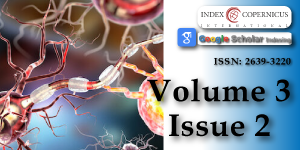Immunohistochemical expression of Nestin as Cancer Stem Cell Marker in gliomas
Main Article Content
Abstract
Background: Gliomas represent the most frequent primary tumors of central nervous system (CNS), contributing to more than half of the incidence of brain tumors. Cancer stem cell markers (CSC) identify a group of patients at high risk for progression. Nestin is an intermediate filament (IF) protein was first described as a neural stem cell/progenitor cell marker. Nestin-positive neuroepithelial stem cells are detected in the subventricular zone of the human adult brain and they remain mitotically active throughout adulthood. The expression of Nestin in gliomas has been suggested to be related to dedifferentiation, improved cell motility, invasive potential and increased malignancy. This study aims to investigate Nestin immunohistochemical expression in different types of glioma and its correlation with different clinicopathological parameters.
Materials and Methods: Nestin immunostaining was studied in 60 specimens of glioma using avidin-biotin peroxidase method.
Results: Nestin was strongly expressed in 11/60 (18.33%), moderately expressed in 29/60 (48.33%) and weekly expressed in 15/60 (25%) of studied gliomas. A significant positive correlation was found between Nestin expression and histologic type (p < 0.001) and increasing grade of gliomas (p < 0.001).
Conclusion: Increased Nestin expression is correlated with tumor progression, increasing grade and poor prognostic parameter of glioma. Nestin is a useful marker for detection of CSC in high-grade glioma which is responsible for resistance to chemo-radiotherapy and may serve as a predictor for patient outcomes.
Article Details
Copyright (c) 2019 Abdelkareem RM, et al.

This work is licensed under a Creative Commons Attribution 4.0 International License.
Tadej S. Prognostic Significance of Immunohistochemical Markers in Glioma Patients. Advances in the Biology, Imaging and Therapies for Glioblastoma. 2011; 284-285.
Sanai N, Chang S, Berger MS. Low grade gliomas in adults. J Neurosurg. 2011; 115: 948-965. PubMed: https://www.ncbi.nlm.nih.gov/pubmed/22043865
Ostrom QT, Gittleman H, Fulop J, Liu M, Blanda R, et al. CBTRUS statistical report: primary brain and central nervous system tumors diagnosed in the United States in 2008–2012. Neuro-oncol. 2015; 17: 1-62. PubMed: https://www.ncbi.nlm.nih.gov/pubmed/26511214
Ibrahim AS, Khaled HM, Mikhail NNH, Baraka H, Kamel H. Cancer Incidence in Egypt: Results of the National Population-Based Cancer Registry Program. J Cancer Epidemiol. 2014; 437971: 1-18. PubMed: https://www.ncbi.nlm.nih.gov/pubmed/25328522
Li SC, Vu LT, Ho HW, Yin HZ, Keschrumrus V, et al. Cancer stem cells from a rare form of glioblastoma multiforme involving neurogenic ventricular wall. Cancer Cell Int. 2012; 12: 41. PubMed: https://www.ncbi.nlm.nih.gov/pubmed/22995409
Hegi ME, Diserens AC, Gorlia T, Hamou MF, de TN, et al. MGMT gene silencing and benefit from temozolomide in glioblastoma. N Engl J Med. 2005; 352: 997-1003. PubMed: https://www.ncbi.nlm.nih.gov/pubmed/15758010
Bao S, Wu Q, Li Z, Sathornsumetee S, Wang H, et al. Targeting cancer stem cells through L1CAM suppresses glioma growth. Cancer Res. 2008; 68: 6043-6048. PubMed: https://www.ncbi.nlm.nih.gov/pubmed/18676824
Murre C. Helix–loop–helix proteins and the advent of cellular diversity: 30 years of discovery. Genes & Dev. 2019; 33: 6-25. PubMed: https://www.ncbi.nlm.nih.gov/pubmed/30602438
Dahlrot RH, Hermansen SK, Hansen S, Kristensen BW. What is the clinical value of cancer stem cell markers in gliomas? Int J Clin Exp Pathol. 2013; 6: 334-348. PubMed: https://www.ncbi.nlm.nih.gov/pubmed/23412423
Zhang M, Song T, Yang L, Chen R, Wu L, et al. Nestin and CD133: valuable stem cell-specific markers for determining clinical outcome of glioma patients. J Exp Clin Cancer Res. 2008; 27: 8. PubMed: https://www.ncbi.nlm.nih.gov/pubmed/19108713
Ishiwata T, Matsuda Y, Naito Z. Nestin in gastrointestinal and other cancers: effects on cells and tumor angiogenesis. World J Gastroenterol. 2011; 17: 409-418. PubMed: https://www.ncbi.nlm.nih.gov/pubmed/21274370
Dahiya S, Lee da Y, Gutmann DH. Comparative characterization of the human and mouse third ventricle germinal zones. J Neuropathol Exp Neurol. 2011; 70: 622-633. PubMed: https://www.ncbi.nlm.nih.gov/pubmed/21666496
Lépinoux-Chambaud C, Eyer J. Review on intermediate filaments of the nervous system and their pathological alterations. Histochem Cell Biol. 2013; 140: 13-22. PubMed: https://www.ncbi.nlm.nih.gov/pubmed/23749407
Arai H, Ikota H, Sugawara K, Nobusawa S, Hirato J, et al. Nestin expression in brain tumors: it's utility for pathological diagnosis and correlation with the prognosis of high-grade gliomas. Brain Tumor Pathol. 2012; 29: 160-167.
Louis DN, Ohgaki H, Wiestler OD, Cavenee WK. WHO Classification of Tumors of the Central Nervous System. Revised 4th ED. Lyon: IARC. 2016.
Strojnik T, Rosland GV, Sakariassen PO, Kavalar R, Lah T. Neural stem cell markers, Nestin and musashi proteins, in the progression of human glioma: correlation of Nestin with prognosis of patient survival. Surg Neurol. 2007; 68: 133-143. PubMed: https://www.ncbi.nlm.nih.gov/pubmed/17537489
Ma YH, Mentlein R, Knerlich F, Kruse ML, Mehdorn HM, et al. Expression of stem cell markers in human astrocytoma of different WHO grades. J Neurooncol. 2008; 86: 31-45. PubMed: https://www.ncbi.nlm.nih.gov/pubmed/17611714
Kitai R, Horita R, Sato K, Yoshida K, Arishima H, et al. Nestin expression in astrocytic tumors delineates tumor infiltration. Brain Tumor Pathol. 2010; 27: 17-21. PubMed: https://www.ncbi.nlm.nih.gov/pubmed/20425043
Wan F, Herold-Mende C, Campos B, Centner FS, Dictus C, et al. Association of stem cell-related markers and survival in astrocytic gliomas. Biomarkers. 2011; 16: 136-143. PubMed: https://www.ncbi.nlm.nih.gov/pubmed/21323603
Hatanpaa KJ, Hu T, Vemireddy V, Foong C, Raisanen JM, et al. High expression of the stem cell marker Nestin is an adverse prognostic factor in WHO grade II–III astrocytoma and oligoastrocytomas. J Neuro oncol. 2014; 117: 183-189. PubMed: https://www.ncbi.nlm.nih.gov/pubmed/24519516
Lin A, Marchionni L, Sosnowski J, Berman D, Eberhart CG, et al. Role of Nestin in glioma invasion. World J Transl Med. 2015; 4: 78-87.
Rani SB, Mahadevan A, Anilkumar SR, Raju TR, Shankar SK. Expression of Nestin - a stem cell associated intermediate filament in human CNS tumors. Indian J Med Res. 2006; 124: 269-280.
Chinnaiyan P, Wang M, Rojiani AM, Tofilon PJ, Chakravarti A, et al. The prognostic value of Nestin expression in newly diagnosed glioblastoma: report from the Radiation Therapy Oncology Group. Radiat Oncol. 2008; 3: 32. PubMed: https://www.ncbi.nlm.nih.gov/pubmed/18817556
Kim KJ, Lee KH, Kim HS, Moon KS, Jung TY, et al. The presence of stem cell marker-expressing cells is not prognostically significant in glioblastomas. Neuropathology Oct. 2011; 31: 494-502. PubMed: https://www.ncbi.nlm.nih.gov/pubmed/21269333





